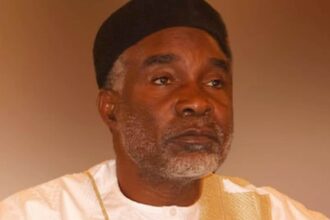...To get all news updates, Join our WhatsApp Group (Click Here)
Also Join our WhatsApp Channel (Click Here)
Justice Jude Okeke of the Federal Capital Territory High Court has fixed April 5, for ruling on the no-case-submission filed by the Federal High Court Judge, Justice Adeniyi Ademola and two others.
Justice Ademola, his wife, Olabowale and Joe Agi (SAN), are standing trial over allegation of conspiracy, receipt of gratification and illegal possession of fire arms.
At the close of case by the prosecution on February 21, the defendants had filed a no-case-submission, stressing that there was no need to enter defense.
Thus, at the resumed hearing yesterday, counsel to the first defendant (Justice Ademola), Onyechi Ikpeazu (SAN), told the court that since the prosecution has failed to establish a primae facie evidence to warrant the first defendant to enter his defense, the court should uphold the no-case-submission and strike out the case accordingly.
Taking the charges for which his client is being tried one after the other, Ikpeazu maintained that there was no evidence to further sustain the case.
On the count of acceptance of gratification, the counsel argued that the evidence of Prosecution Witness 16 – Babatunde Adepoju, an operative of State Security Service (SSS), had adequately proved otherwise.
Ikpeazu noted that he was the witness that carried out investigation on the defendants, and he had told the court that he could not link the alleged gratification with any case handled by Justice Ademola.
In his argument, counsel to Mrs. Ademola, Chief Robert Clerk (SAN), noted that his client was charged with conspiracy, an offense that was not recognised under the Penal Code.
On the statement that she fraudulently enriched the first defendant, the counsel expressed surprise that the word ‘conspiracy’ could be attached to a man, who was alleged to have committed an offense.
He added that the prosecution should establish the case or cases for which the money was allegedly paid as inducement. According to him, no single witness had testified to have given the amount as bribe, neither did any of them point to any monetary transfer from the accounts of second or third defendants to that of the first defendant.
Counsel to the third defendant (Agi), Jeph Ejinkonye, urged the court to take another look at the account of prosecution witnesses to see if there was any need for his client to enter defense.
The PW 16, Adepoju, had admitted that it would be mere speculation to say that the gift given to the first defendant by President Muhammadu Buhari’s lawyer was a bribe.
Based on the above statement by PW 16, Ejinkonye urged the court to uphold the no-case-submission and strike out the case.But the prosecution counsel, Segun Jegede, opposed the no-case-submission, insisting that the defendants have enough case to answer.
He believed that the witnesses actually established enough primae facie that money was paid by the third defendant into the account of the second defendant in March 2015. The judge adjourned till April 5.
You can get every of our news as soon as they drop on WhatsApp ...To get all news updates, Join our WhatsApp Group (Click Here)
Also Join our WhatsApp Channel (Click Here)









